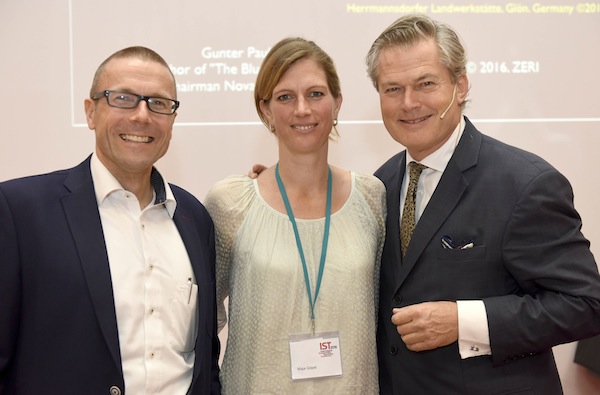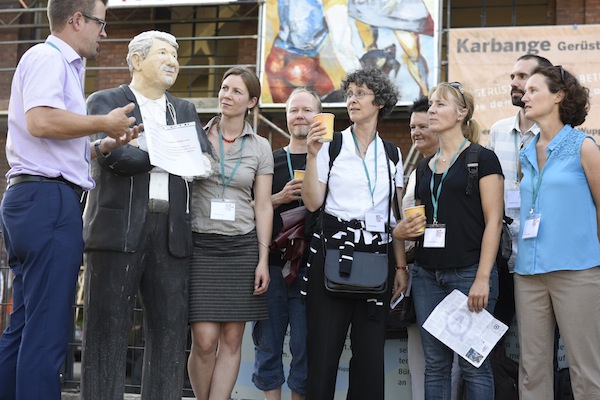IST 2016: Reflecting on advances in transition research and practice
7th International Sustainability Transitions (IST) Conference, Wuppertal, 6 - 9 September 2016


The 7th International Sustainability Transitions (IST) Conference was hosted by the Wuppertal Institute in cooperation with the Center for Transformation Research and Sustainability (TransZent) at the University of Wuppertal.
The conference is the annual platform to share theoretical, empirical and practical advances in the field of sustainability transitions. It is part of the activities of the Sustainability Transitions Research Network (STRN). The field of sustainability transitions research and the respective scientific community has grown successfully since the late 1990s and has developed as a distinct field with its own research agenda, theoretical concepts and research approaches, increasing scientific publication activities and political influence at EU and national levels, an own journal (Environmental Innovation and Societal Transitions) and annual conference. The focus of sustainability transitions research is on transformations of major socio-technical systems of provision and use in areas such as energy, water, mobility and food towards more sustainable societies. Sustainability transitions research focuses on the dynamics of system change, studying innovation in its various forms (social innovation, technological innovation, business model innovation, infrastructural innovation, institutional innovation). It is a multi-disciplinary field with inputs from economics, science and technology studies, geography, political science, management, sociology and history. It is also a transdisciplinary field in the sense that it focuses on "real-world problems", is impact- and solution-oriented, and aims at fostering societal change towards sustainable development.
The IST 2016 conference was guided by the theme "Exploring Transition Research as Transformative Science" and offered a platform for sharing experiences, critically discussing and further developing impact- and solution-oriented research approaches enabling transitions in practice. The aim of the conference was to reflect on the challenges and lessons learned in concrete research projects, on theoretical contributions advancing the understanding and conceptualization of transitions, and on the role of science and scientists involved in transitions to sustainability. With the focus on the role of transformative science for sustainability and on transdisciplinary research settings in various kinds of "transition labs", it was an opportunity to create momentum for core themes of the German sustainability science community. As a special cooperation initiative between STRN and the German Federal Ministry of Education and Research's (BMBF) Program "Research for Sustainable Development" (FONA3) the IST Conference included a side session on the BMBF's funding initiative "Sustainable Economy" in the context of its funding priority "Social-Ecological Research" (SÖF).
Other key topics at IST 2016 included the broad range of issues and debates in sustainability transitions research, such as the governance of sustainability transitions in energy, mobility, food or water systems, the role of politics and power, of actors, institutions, infrastructures, technological and social innovation. Another central issue relates to the transition towards a sustainable economy focusing on more sustainable consumption and production patterns, the role of industry incumbents and sustainable entrepreneurship, and the search for alternative indicators of well-being at local and global levels. Increased interest has also emerged for non-European contexts and the question whether existing transitions frameworks can be applied in other parts of the world and how local bodies of knowledge and contextual aspects can be integrated. Theoretical advances in transition studies, building on core concepts such as the multi-level perspective, technological innovation systems, transition management and reflexive governance of sustainability, but also theories of change from other fields and critical approaches, as well as methodological advances in transition studies have been explored at IST 2016.
The broad range of topics was also reflected in the diversity of keynote speakers, ranging from research and policy perspectives on well-being indicators by Carrie Exton (OECD) and Cathy Maguire (European Environment Agency), theoretical perspectives on transdisciplinarity and transformation research by Roland Scholz (Danube University) and Maja Göpel (Wuppertal Institute), theoretical and practice perspectives on transitions by Derk Loorbach (DRIFT) and Rob Hopkins (Transition Network), on the "Blue Economy" by Gunter Pauli and international perspectives on the energy transition by Peter Hennicke (Wuppertal Institute), Thomas Johansson (Lund University) and Hironori Hamanaka (IGES).
As a special side event, the IST 2016 provided an opportunity for the conference participants to visit Wuppertal's urban real-world lab in the Arrenberg neighbourhood, to meet and get to know people active in various initiatives and experience transitions in practice.
